


Along with records broken and medals celebrated, competing at the Olympics is more often littered with narrow defeats, last-gasp errors and mental meltdowns that build true character and sportsmanship.
Editor's note: With the Olympic stage set, and golden glory beckoning, Chinese athletes have been going all-out to ensure it will be a medal-laden campaign at Paris 2024.

Zhang Zhizhen
Age: 27
Event: tennis, men's singles
Zhang Zhizhen clinched his spot at the Paris Olympics directly by winning gold at the Hangzhou Asian Games last year. At Wimbledon this month, the Shanghai native achieved the milestone of winning a match at all four Grand Slams and reached a world ranking of 31, the highest of any male Chinese player. Zhang has reached the third round at the past two French Opens, and, with his strong performance on clay courts, he could boost China's prospects in the tennis competition at the upcoming Olympics.
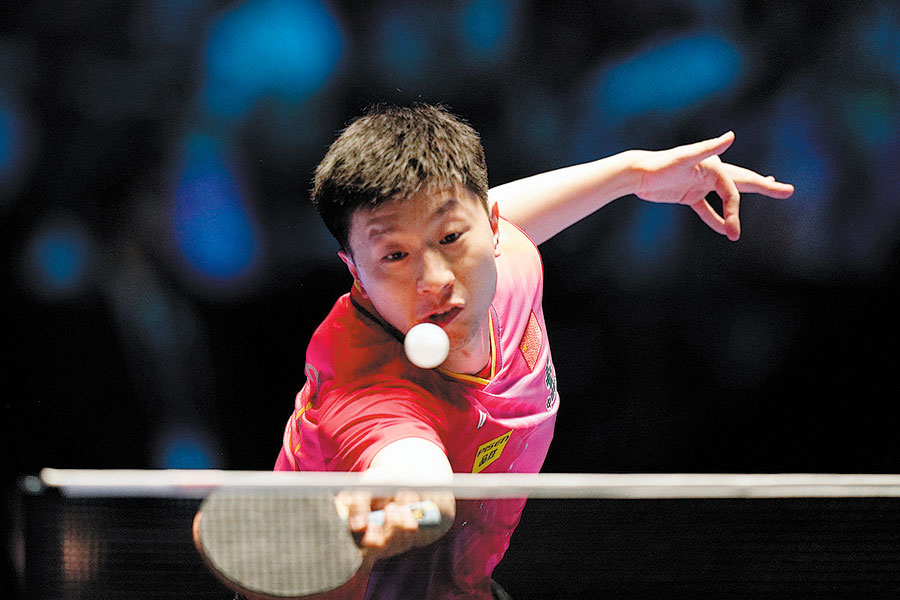
Ma Long
Age: 35
Event: table tennis, men's team
In his fourth Olympic appearance, Ma Long stands as a legendary figure in Chinese table tennis. At the Paris Olympics, he will focus solely on the men's team event, aiming to guide China to another victorious title defense. A triumph would earn him his sixth Olympic gold medal, cementing his status as the nation's most decorated Olympic athlete.
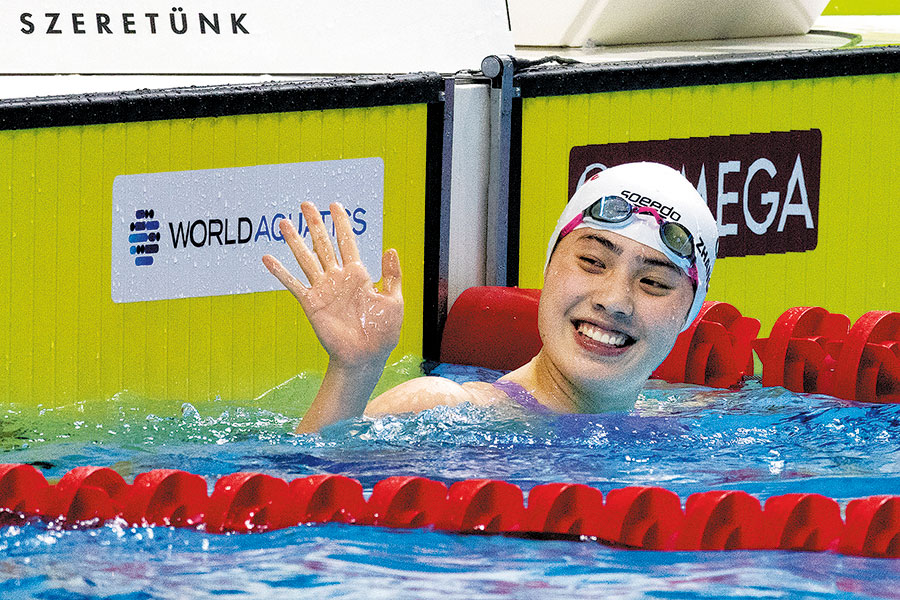
Zhang Yufei
Age: 26
Event: women's swimming
"The Butterfly Queen" Zhang Yufei is gearing up for her title defense at the Paris Olympics. A formidable contender in both the women's 100m and 200m events, Zhang faces fierce competition. At the Tokyo Olympics, she secured two gold and two silver medals. For Paris, she has set her sights on surpassing her Tokyo medal tally and achieving a new world record.
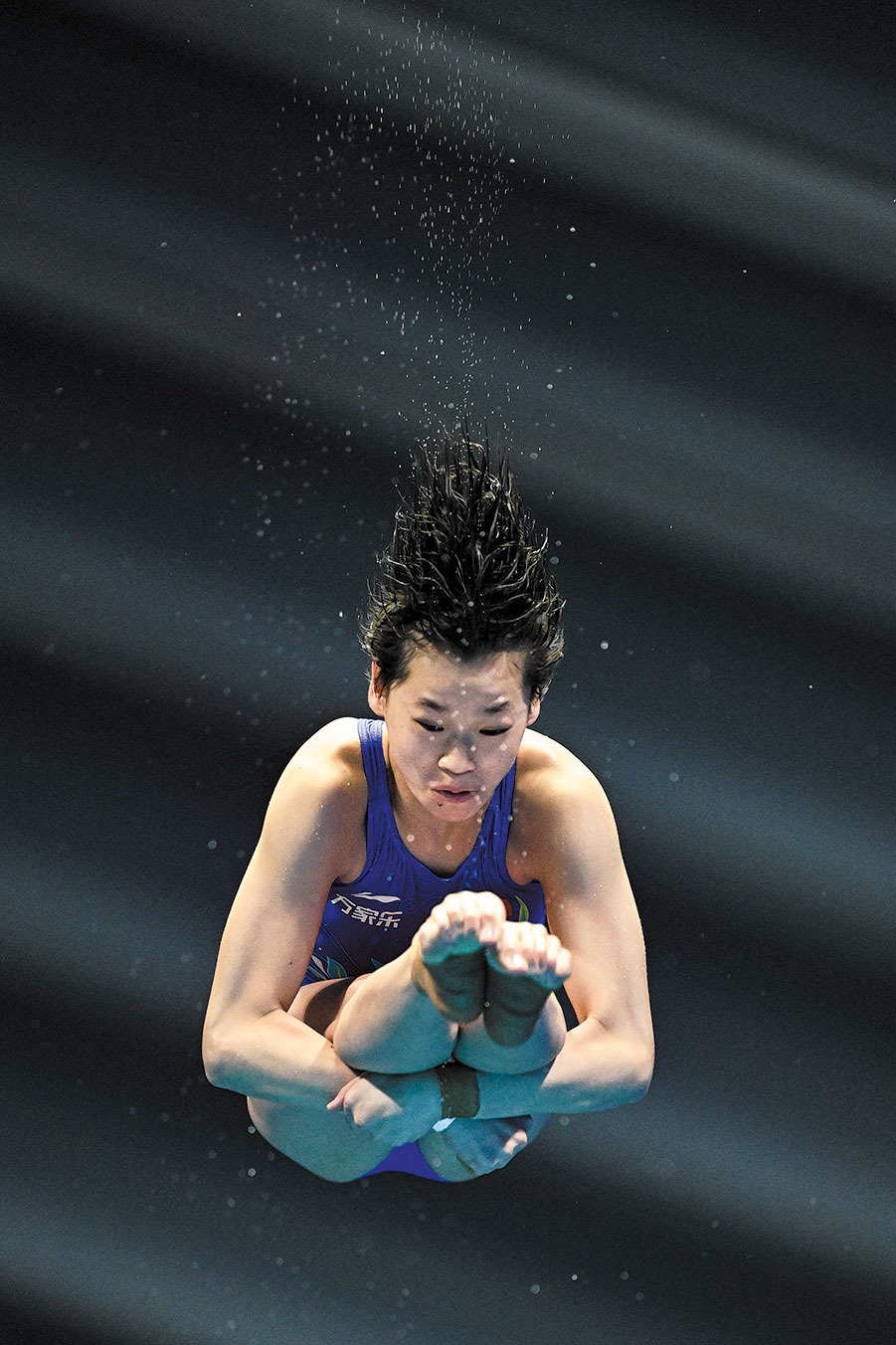
Quan Hongchan
Age: 17
Event: women's 10m platform& women's synchronized 10m platform
At just 17, Quan Hongchan will be competing at her second Olympics in Paris. In Tokyo, the then-14-year-old wowed audiences by scoring perfect 10s on three of her dives in the 10m platform final, winning gold.
In Paris, Quan will defend her title, competing alongside compatriot Chen Yuxi. The pair, who have dominated recent competitions, will showcase their "splashless "dives. Quan is confident, stating, "I aim to raise the Chinese flag to the highest point."
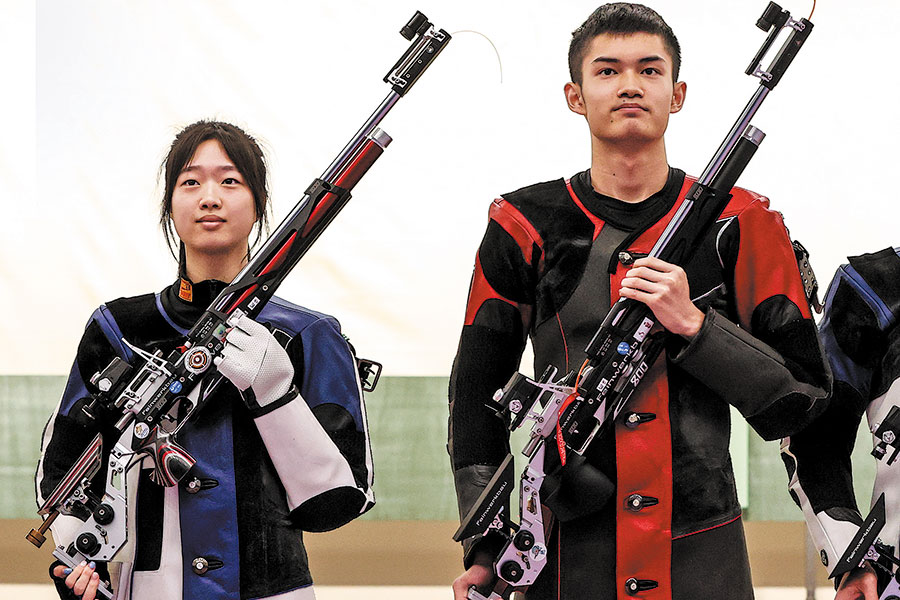
Huang Yuting/Sheng Lihao
Age: 17/19
Event: 10m air rifle mixed team
According to the Paris Olympics schedule, the first gold medal is likely to be awarded in the 10m air rifle mixed team event. China's Huang Yuting and Sheng Lihao are strong contenders for this medal, aiming to uphold the tradition of the Chinese shooting team by clinching the first victory for the national delegation.
The duo has partnered in the 10m air rifle mixed team event throughout the current Olympic cycle, showcasing impressive form and securing top podium finishes at prestigious events, including the World Cup, World Championships and last year's Asian Games.

Qin Haiyang
Age: 25
Event: men's swimming
In the past two years, Qin Haiyang has demonstrated extraordinary prowess. At the 2023 World Aquatics Championships in Fukuoka, Japan, he broke the men's 200m breaststroke world record with a time of 2:05.48, winning gold. He also made history by becoming the first athlete to sweep the men's 50m, 100m, and 200m breaststroke titles at a single World Championships.
Named World Aquatics' Best Male Swimmer of 2023, Qin now has gold in both the 100m and 200m breaststroke at the Paris Olympics in his sights. He will, however, face fierce competition from top Australian and US swimmers.
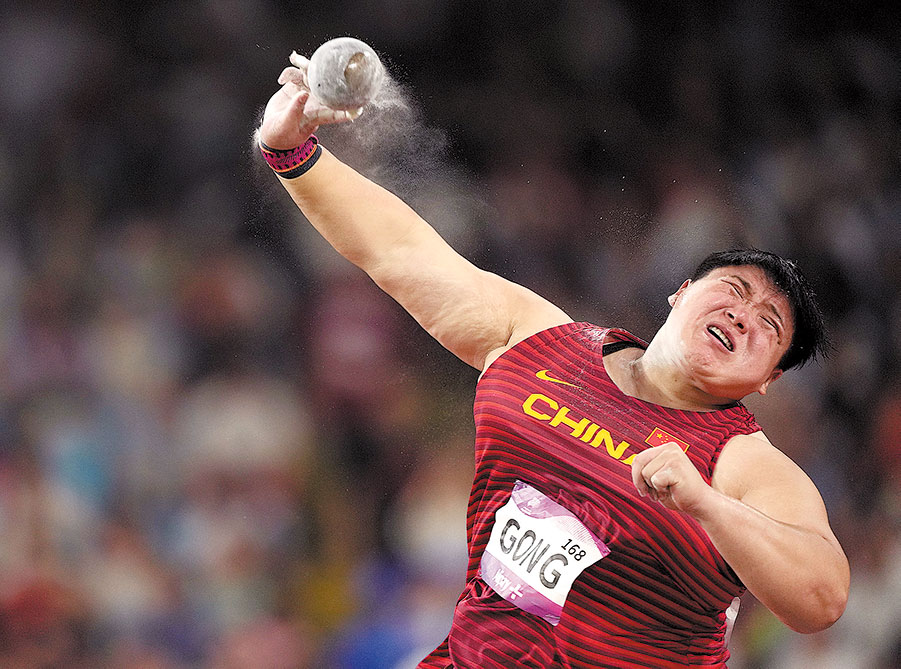
Gong Lijiao
Age: 35
Event: women's shot put
At 35, Gong Lijiao is gearing up for her fifth Olympic appearance, leading the Chinese athletics team to Paris. In Tokyo, she recorded a personal best of 20.58 meters in the women's shot put, winning Olympic gold to complete a "grand slam" of titles. Despite the inevitable challenges of age, including injuries and stamina issues, Gong's goal remains unwavering: to defend her Olympic title and achieve a 21-meter throw.

Zhu Ting
Age: 29
Event: women's volleyball
Zhu Ting announced her much-anticipated return to the Chinese women's national volleyball team via social media in April. Her comeback has already paid off, as China secured its Olympic berth through world rankings in this year's FIVB Volleyball Nations League. Zhu is now focused on syncing with her teammates and fine-tuning her form to peak just in time for the Olympics.
After navigating a period of setbacks and poor results, the Chinese team will arrive at the Paris Games with a determined edge.
Drawn in Group A, alongside formidable opponents like host France, Serbia and the US, Team China's journey to the podium will be a tough one.

With the stage set and Olympic glory up for grabs, the Chinese delegation will go all out to demonstrate its athletic prowess in Paris, while promoting friendship, unity and integrity at the sporting gala.
Boasting a blend of youth and experience, the 716-strong delegation, including 405 athletes, is primed to compete in 236 medal events across 30 sports at the 2024 Summer Olympics, which open on Friday in the French capital and close on Aug 11.
The Paris Games will host the biggest Chinese delegation, in terms of both number and variety, at an Olympics held outside of China.
Since China made its debut at the 1984 Los Angeles Games, the nation has won a total of 263 gold medals at Summer Olympics.
The Chinese team competing in Paris is confident of another productive performance, with the majority of its medals drawn from the six sports it is traditionally strong in — table tennis, badminton, gymnastics, shooting, weightlifting and diving.
Chinese Olympic athletes in these six sports have won a whopping 192 Olympic gold medals over the past four decades, and are expected to spearhead another gold rush in the French capital.
With the attention of the globe focused on one of the world's biggest sporting events, the Chinese Olympic Committee has called on its Olympians to not only strive for athletic success, but also use the occasion to promote sportsmanship, fair play and the country's vibrant image to the world.
"We have to take the Olympic stage to demonstrate the superb competitive level and good spirit of Chinese athletes, as well as to present the thriving, prosperous and bright future of our country in the new era from the sports perspective," Gao Zhidan, president of the COC, said earlier this month after the delegation was announced.
In his pep talk to the delegation, Gao said the most important task was that all Chinese athletes respect and honor anti-doping regulations, stick to strict doping control routines, and make sure medals are won in a fair and clean manner.
"We've pledged to make the best efforts and adopt more rigorous measures against doping to guarantee that we have zero doping violation cases prior to, during, and after the Games," Gao said.
Led by 42 Olympic champions, the Chinese delegation also hopes to test its up-and-coming athletes against the world's best. More than half the athletes, 223, are making their Olympic debuts in Paris.
The delegation, with an average age of 25, is made up of 136 male and 269 female athletes, with 37-year-old Olympic champion race walker Liu Hong the oldest competitor, and 11-year-old women's park skateboarder Zheng Haohao the youngest.
Striving for perfection
Leading China's charge are the country's dominant table tennis squad and its diving "dream team", which are both aiming for gold medal clean sweeps in their respective programs.
As the sport's undisputed powerhouse, the table tennis squad is looking to achieve perfection in Paris when it comes to gold medals won.
China has won 32 of a possible 37 gold medals since table tennis debuted at the 1988 Seoul Summer Games.
Three years ago, at the postponed Tokyo Olympic Games, China won four of the five table tennis gold medals on offer. The hosts Japan unexpectedly defeated China in the mixed doubles, which has helped motivate the Chinese players to strive for complete triumph this time around.
Liu Guoliang, president of the Chinese Table Tennis Association, has warned the squad against complacency.
"We cannot take for granted that these five gold medals belong to China," said Liu, a two-time Olympic champion at the 1996 Games.
"All five gold medals in Paris are reserved for the brave and the wise, for those who excel the most. We just need to fight for them as hard as we can in every event."
Led by the world's top divers across multiple events, the Chinese diving team is also on a mission to extend its Olympic supremacy in Paris by achieving something never done before — a clean sweep of all eight titles at a single Games — after having bagged seven golds at the last Tokyo Olympics and the Rio 2016 Games.
As challenging as it sounds, the squad believes the target can be achieved in Paris, with a 10-strong roster that includes the reigning world champions in all eight Olympic diving events.
"We've always been very confident in our strength. We are expecting to perform to the best of our ability in Paris and are trying to deliver the best possible results," said Zhou Jihong, a former Olympic champion diver and director of the National Aquatic Sports Administrative Center.
Since arriving in Paris on July 21, the team has had training sessions every day at the Olympic Aquatics Centre in Saint-Denis to fine-tune the divers' routines. The diving competition starts on Saturday, when the first gold medal will be awarded in the women's synchronized 3m springboard.
"Actually, I felt quite calm, more relaxed than I'd expected, after getting to the Olympic venue. Mentally, I feel at ease and ready to go," said Chen Yiwen, who will attempt to win China's first gold at the Games with partner Chang Yani in Saturday's synchro final.
However, they could be pipped in winning China's first gold by the shooting team. The 10m air rifle mixed team final is due to be held around the same time as the diving session on Saturday.
Two world champion pairs — Sheng Lihao and his partner Huang Yuting, and Han Jiayu and Du Linshu — have been sharpening their skills at the Olympic shooting range at Chateauroux, about 250 kilometers south to Paris, in preparation to going for gold.
Major breakthroughs
In two of the biggest Olympic sports, China's fast-improving swimmers are determined to prove that they can compete with the sport's traditional powerhouses — the United States and Australia — on all fronts, while the track and field team is expected to deliver more breakthroughs.
Led by "butterfly queen" Zhang Yufei and "breaststroke king" Qin Haiyang, China's 31-member swimming squad has been preparing for the Games in the coastal city of Deauville in northern France since July 6. The swim team is hoping to better its Tokyo performance when it harvested six medals, including three golds.
Zhang, the reigning 200m men's butterfly Olympic champion, and Qin, the 200m men's breaststroke world record holder, represent a new generation of Chinese swimmers that pose a legitimate threat to the world's best swimmers.
Four new world records set at Olympic trials in the US, Australia and Canada over the past two months, however, have underlined the tough challenge Chinese swimmers face to continue their winning ways when the swimming program gets underway on Saturday.
Sharing the spotlight with Zhang and Qin is teen sensation Pan Zhanle, who broke the 100m men's freestyle world record by clocking 46.80 seconds in the leadoff leg of the 4x100m men's freestyle relay at the Doha world championships in February.
Powered by Pan, Team China won both men's freestyle relays and the mixed 4x100m freestyle relay in Doha. Combined with victory in the women's 4x200m freestyle relay, it was the country's best result in swimming relays at the long-course world titles.
"It will be my first time participating in the Olympics," Pan said. "My main goal is to relax and not feel too much pressure. I'm not concerned about the results for now; I just want to give it my all."
Nine artistic swimmers will participate in the Paris Games, including twin sisters Wang Liuyi and Wang Qianyi, world champions in the duet event.
China's track and field team will be anchored by five-time Olympian Gong Lijiao, who wants a golden end to her career in Paris by defending her women's shot put title. However, she faces stiff challenges from Canadian Sarah Mitton, the best performer in the world this year, and two-time world champion Chase Jackson of the US.
"This is my fifth Olympic Games," said 35-year-old Gong.
"Although I am very familiar with the event, I'm still doing my best to prepare. I want to produce a good performance at my final Olympics and have no regrets. My goal is to always strive for the championship and to achieve my personal best."
Leading the way for the men is long jumper Wang Jianan, who won China's first men's world championship gold medal in 2022. The 27-year-old three-time Olympian wants to finally stand on the Olympic podium after falling short at the previous two Games.
Last year, Wang defended his Asian Games title in Hangzhou, Zhejiang province, with a jump of 8.22m. This season, he secured second place with a jump of 8.04m at the Diamond League event in Suzhou, Jiangsu province, in April.
"I believe the most important thing is to prepare well, cooperate with my coach and team, and make any adjustments that are needed," he said. "I hope to perform well in Paris and to make up for the disappointment in Tokyo."
Surprises, diversification
Aiming to demonstrate the country's improving competitiveness across a wider range of sports, the COC has also pinned high hopes on events, such as tennis, fencing, Taekwondo, cycling (track and BMX), boxing and sports climbing, to produce more medals and develop emerging stars on the Olympic stage.
To improve competitiveness in sports dominated by Western nations, such as swimming, track and field, fencing and cycling, the Chinese delegation hired 42 foreign coaches, trainers and medical staff from 17 countries and regions to help prepare for the Games.
Xinhua contributed to this story.
The World Anti-Doping Agency reiterated on Thursday that its handling of a contamination case involving Chinese athletes was fair and appropriate, and urged the United States anti-doping authorities to keep up with international rules.
On the eve of the opening ceremony of the Paris 2024 Olympic Games, the international anti-doping regulator called a high-profile news conference to defend its integrity, legality and consistency in adhering to the global anti-doping code in its handling of a case involving 23 Chinese swimmers being contaminated by a banned substance in 2021.
The agency has again strongly denied groundless accusations made by some media outlets and the US Anti-Doping Agency that it helped "cover up" intentional doping in the case.
Witold Banka, president of WADA, called on the US authorities to focus more on taking care of their business back home by ensuring that the country's domestic anti-doping efforts stayed in line with international regulations and the global anti-doping code.
"Everything was in line with the regulations and with the code to appoint an independent prosecutor (to review the case involving Chinese athletes)," Banka said at the Main Press Centre in Paris, in response to questions on how the regulator handled the case.
"The conclusion (of the independent prosecutor's report) couldn't be any clearer that WADA didn't show any bias toward China, or any interference, or other impropriety in its assessment of the China Anti-Doping Agency's decision.
"It's very important that WADA's decision not to appeal the case in the Court of Arbitration for Sport was indisputably reasonable," he added.
An investigation by the China Anti-Doping Agency proved that the 23 swimmers, who tested positive for trimetazidine during a national championship in January 2021, had ingested the drug unwittingly after being inadvertently exposed to it at a hotel. Therefore, their tests returned positive for an "extremely low concentration" of the banned substance.
After thoroughly probing the case, and supported by external consultations, both World Aquatics, the international governing body for swimming, and WADA agreed to the China Anti-Doping Agency's conclusion that it was a contamination incident and decided not to appeal the ruling.
No athletes involved in the incident were held accountable for intentional doping violations, and neither were any suspensions imposed.
Olivier Niggli, director-general of WADA, said at the news conference that any concrete evidence regarding the case is welcome, but indicated that new leads claimed by some media had turned out to be "hearsay" rather than verified facts.
"We never said that we would not look at new evidence. But are we talking about evidence, or are we talking about other things?" Niggli said. "We never said we would not reopen or look at whatever new evidence has come up, if there is anything that can be called evidence that is given to us.... I mean, there's a difference between evidence and hearsay."
Stating that 90 percent of US athletes competing in the country's collegiate sports system and in major professional leagues in North America are not monitored under the WADA system, Banka urged the US anti-doping authorities to bring US athletes under WADA's scope in compliance with international rules.
"This is a serious issue we raised many times in our statements. I think this issue has to be addressed, and it's the USADA's responsibility," Banka said.
"In accordance with the data published by the US Olympic and Paralympic Committee ... 75 percent of current American Olympians participating in the Olympic Games in Paris are coming from this system (which is isolated from the WADA code and regulations). So definitely there is a gap in the US anti-doping system," he added.
According to the International Testing Agency, an independent body that delivers anti-doping programs, nearly 90 percent of all athletes competing in the Paris Olympics have been tested at least once this year as part of a pre-Games program, and among them, Chinese athletes have completed the tests more regularly.
World Aquatics also confirmed that Chinese swimmers competing in Paris have been tested "on average 21 times each since January 1" and no positive results have been reported, compared with only six times for each US athlete, five for each Italian athlete, and four for each Australian, British and French athlete.
The China Anti-Doping Agency, or CHINADA, has called on all its global counterparts, relevant stakeholders, and organizations to jointly strengthen the solidarity, equity, and independence of world anti-doping efforts.
CHINADA made the call in a statement released on Thursday, right after the International Olympic Committee, or IOC, strongly urged the United States Anti-Doping Agency and US lawmakers to respect the authority of the World Anti-Doping Agency, or WADA, and to comply with unified global anti-doping rules at its 142nd Session in Paris on Wednesday.
Salt Lake City, in the US state of Utah, was awarded rights to host the 2034 Winter Olympics at the session, but the IOC also warned that the city could be stripped of the Games in line with a revised host-city contract, if the US authorities keep disrespecting WADA and refuse to follow global anti-doping rules.
"CHINADA welcomes the IOC's decision and hopes that all shareholders could unanimously support WADA's effort of building an independent, fair, consistent, and effective anti-doping administration worldwide," said the CHINADA statement published on its website.
During a news conference held at the Main Press Center in Paris, WADA president Witold Banka called on USADA to stop being isolated from global anti-doping regulations that are recognized, respected, and followed by the rest of the world, and urged the US authorities to bring US athletes under the same scrutiny overseen by WADA as is consistent with other countries' athletes.
The attempt by US legislation called the Rodchenkov Act to recklessly and unfairly extend the country's jurisdiction of anti-doping probes to other countries and regions, taking advantage of groundless, hyped media allegations of a "doping cover-up" regarding a proven contamination case involving Chinese athletes, poses a threat to the integrity and unity of the global anti-doping system, WADA said.
CHINADA called the "long-arm jurisdiction" of US authorities a potential infringement of the legal rights and security of the athletes involved.
"It will certainly undermine the unified global legal framework of anti-doping work, disrupt the effective world anti-doping orders jointly built by all shareholders and damage the global anti-doping administration that protects all clean athletes fairly and consistently," CHINADA said in the statement. "Hereby, we reiterate the importance of safeguarding the completeness and effectiveness of the global anti-doping system in an independent, fair, professional and open way. We sincerely hope to work tirelessly together with all shareholders to improve the stability, unity, and progress of the world anti-doping system."
The World Anti-Doping Agency has reiterated it's handling of the contamination case involving Chinese athletes was reasonably fair and appropriate, while urging the United States' anti-doping system to keep up with the international rules.
One day before the opening of the Paris Olympics, WADA took it to a high-profile pre-Games news conference on Thursday to defend its integrity, legality and consistency to globally-recognized rules and codes in its handling of a case involving 23 Chinese swimmers being contaminated by a banned substance in early 2021.
The global anti-doping regulator has also strongly denied groundless accusations again by some media outlets, and in particular, the United States Anti-Doping Agency that it had helped "cover up" intentional doping.
Witold Banka, president of WADA, also stressed that the US authorities should focus more on taking care of their own business back home by making sure that the domestic anti-doping system in the States stays in line with the global regulations and code.
"Everything was in line with the regulations, with the code to appoint the independent prosecutor (to review the case involving Chinese athletes). The conclusion (of the independent prosecutor report) shouldn't be any clearer that WADA didn't show any bias towards China, or any interference or another other impropriety in its assessment of the Chinese Anti-Doping Agency's decision," Banka responded to a question on WADA's handling of the case during the news conference at the Main Press Center in Paris.
"It's very important that WADA's decision not to appeal the case to the Court of Arbitration for Sport was indisputably reasonable."
The 23 swimmers involved in the case, who tested positive for trimetazidine (TMZ) during the national championships in January 2021, were proven by a CHINADA investigation to have ingested the substance unwittingly after inadvertently being exposed to it at a hotel so that their tests returned positive results for an "extremely low concentration" of the substance.
After running thorough probes into the case, supported by external consultations, both World Aquatics and WADA had agreed on CHINADA's conclusion that it was a contamination incident and decided not to appeal the ruling by the Chinese anti-doping authorities. No athletes involved in the incident were held accountable for intentional doping violations, nor any suspensions were imposed.
Olivier Niggli, WADA's director general who also attended the news conference, said any concrete further evidence regarding the case is welcomed, but so far what has been reported by some media as new leads into the case has turned out more like "hearsay" than verified evidence.
"We never said that we would not look at new evidence. But are we talking about evidence, or are we talking about other things?" Niggli said.
"We never said we would not reopen or look at whatever new evidence has come up if there is anything that it can be called evidence that is given to us ... I mean, there's a difference between the evidence and hearsay."
Citing the fact that 90 percent of American athletes from the collegiate sports system and the major professional leagues in North America are not monitored under the WADA system, Banka urged that the US anti-doping authorities should make further efforts to keep it up with the rest of the world in compliance with the global regulations.
"This is a serious issue we raised many times in our statements. I think this issue has to be addressed and it's the USADA's responsibility," said Banka.
"Because in accordance with the data published by the US Olympic and Paralympic Committee, by now, there are 75 percent of current American Olympians participating in the Olympic Games in Paris are coming from this system (which is isolated to the world anti-doping code and regulation). So definitely there is a gap in the US anti-doping system. And this is the role of USADA to address this step."

Do you want to experience a Qing Dynasty (1644-1911) emperor's martial spirit and love for hunting?
As depicted in this painting, Emperor Qianlong (r. 1736-1795) expertly rides a horse, drawing his bow, ready to shoot a hare. The intense moment is shared with other nobles, each carrying quivers of arrows, ready for the hunt.
With just one day to go until the start of the Paris Olympics, our athletes are poised like Qianlong's arrows. Let's look forward to their performances, as they challenge themselves and strive for miracles on the global stage.
PARIS - Nearly 90 percent of athletes set to compete in the Paris Olympics have been tested at least once this year, the International Testing Agency (ITA) said on Wednesday.
ITA Foundation Board Chair Valerie Fourneyron told the IOC 142nd Session that it had conducted more than 32,000 doping controls this year, an increase of around 45 percent on tests of athletes in the previous six months.
Fourneyron said that the testing program focused on "high-risk disciplines", in which 75 percent of athletes had been tested three times or more, and 95 percent at least once.
"These results surpassed those for Tokyo 2020, making the Paris 2024 pre-Games testing program the most comprehensive ever to be implemented," said Fourneyron.
Kylian Mbappe wanted to take part in this year's Olympics in his home city, while there were hopes that Lionel Messi would feature for Argentina, but instead the men's soccer tournament at the Paris Games will be largely devoid of the game's star attractions.
As captain of France, and the most famous athlete in the country hosting this year's Games, Mbappe's presence in coach Thierry Henry's Olympic squad would have been an enormous boost for organizers, as well as for the team's chances of winning gold.
But Mbappe, 25, had to accept that his new club Real Madrid would not allow him to participate immediately after playing in the French side that reached the semifinals of Euro 2024 in Germany.
That is the problem for the men's soccer competition, which began on Wednesday and runs until Aug 9.
Clubs are not obliged to release players for a tournament held outside an official FIFA window for international soccer, following straight on from the European Championship and Copa America.
Messi, now 37 and part of the Argentina team that claimed Olympic gold in Beijing in 2008, ruled himself out of Javier Mascherano's squad for Paris shortly before the Copa America in the United States, which Argentina won.
"I spoke with Mascherano, and we immediately agreed on the situation," Messi told ESPN.
"At my age, I don't want to play everything, and I need to make the right choices."
Henry, a French soccer great, also failed to secure the services of several others he had hoped to call up.
"The last time I had so many rejections was when I was at high school," he joked when announcing his team. The most recognizable names are Alexandre Lacazette, the 33-year-old Lyon striker, and new Bayern Munich signing Michael Olise.
The competition is restricted to players aged under 23, apart from a maximum of three overage players per squad.
As well as the superstar names, the tournament is also missing Brazil, which won gold in Rio de Janeiro in 2016 and successfully defended the title in Tokyo three years ago, beating Spain in the final.
Contenders
With Brazil failing to qualify, Argentina must fancy its chances of ensuring a sixth straight Latin American side wins the gold medal.
"Obviously our objective is to try to compete and go all the way, and I think we will have a team that can do that," coach Mascherano, who won gold as a player in 2004 and 2008, said in an interview with South American confederation CONMEBOL.
In Julian Alvarez, the Manchester City striker who won the 2022 World Cup and the recent Copa America, it will have one of the highest-profile players taking part.
Argentina is in Group B with Iraq, Ukraine and a Morocco side that will have the skills of Paris Saint-Germain rightback Achraf Hakimi at its disposal.
France kicks off its campaign against the United States, before also playing Guinea and New Zealand in Group A.
Winner in 1992 and silver medalist in Tokyo, Spain is targeting Olympic gold to add to its triumph at Euro 2024.
Luis de la Fuente, coach of Spain's Euros-winning side, led the team to the final at the last Olympics. Santi Denia, his assistant three years ago, is now the man in charge.
Leading names from the European Championship such as Lamine Yamal are not involved, but another prodigious young Barcelona talent — 17-year-old centerback Pau Cubarsi — will feature.
"He is really proud to be getting the experience of the Olympics. You never know if you will get another chance, even being so young," Denia told Spanish sports daily Marca of Cubarsi.
Spain is in Group C with Uzbekistan, the Dominican Republic and Egypt, which will not be boosted by the inclusion of Liverpool's Mohamed Salah.
Asian Under-23 champion Japan — which named a squad without any overage players — is in Group D alongside Paraguay, Mali and Israel.
Matches will not only be played in Paris, with Nantes, Bordeaux, Nice and Saint-Etienne all hosting games.
The semifinals will be played in Lyon and Marseille, while Parc des Princes in Paris will host the final.
AFP
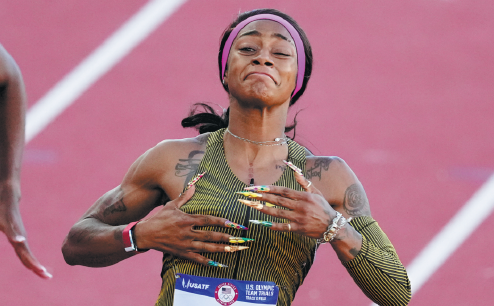
Three years after hitting rock bottom, Sha'Carri Richardson heads to the Olympics poised to conquer the pinnacle of her sport.
The 24-year-old Texan arrives in Paris as the reigning world champion over 100m, and the fastest woman in the world this year with a brisk 10.71 sec under her belt.
Factor in the relative disarray of her main rivals, and it's easy to see why Richardson is a heavy favorite to become the first American since Gail Devers at the 1996 Olympics to be regarded as the world's fastest woman.
It is all a far cry from 2021, when Richardson found herself barred from competing at the pandemic-delayed Tokyo Olympics after testing positive for marijuana during the US trials.
That shattering loss was followed by more disappointment in 2022, when, despite impressive early season form, Richardson failed to qualify for the World Championships after bombing out in the heats at the US trials.
Yet, the tide turned spectacularly last season, when Richardson roared back to form at the World Championships, stunning a high-caliber field from the outside lane to snatch victory in a championship record 10.65 sec.
Throughout her resurgence, Richardson has recited a personal mantra: "I'm not back. I'm better," attributing her return to form as the result of maturing both on and off the track.
"I don't just mean I'm a better runner," she told Vogue magazine in a recent interview.
"It's beyond that. I'm better at being Sha'Carri. I'm better at being myself."
Richardson, who often gives the impression of having a siege mentality, admits that her most challenging opponent has often been herself.
"These last two years I've always had the ingredients to be the athlete I know I can be, and that I train to be," Richardson has said.
'I was angry'
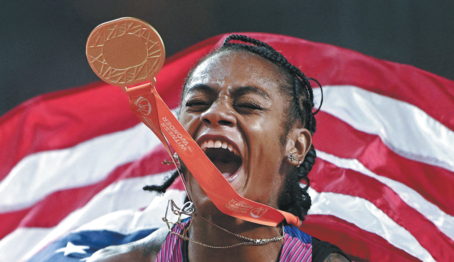
"I feel like, where I am now, I've always been this person — it's just been locked in me.
" (In 2022) I was angry. I saw red everywhere I went. And I was going to make sure everybody felt that as well.
"Now, I'm at a point where I see me. And I want everybody everywhere I go to see me as well. Whether I'm running fast, or sitting here talking to you guys."
Richardson's penchant for long, brightly painted finger nails and colorful hairstyles has earned her comparisons to the late Florence Griffith-Joyner, whose 1988 time of 10.49 sec remains the 100m world record.
Some who have studied Richardson's running style believe she could potentially threaten Flo-Jo's longstanding benchmark.
"She's just built different," said former training partner and 2004 Olympic 100m champion Justin Gatlin.
"Physically, she has, the perfect form. If you have an eye for track and field, the way she strikes and hits the ground, you don't have to coach it, she does it naturally, she picks up speed naturally. It's amazing."
While Richardson is an unabashed admirer of Griffith-Joyner, she insists that "as much as I love that comparison, I'm just me."
"I'm just Sha'Carri Richardson, and I plan on being Sha'Carri Richardson when I leave this sport," she says.
So far in 2024, all the indicators are that Richardson will depart her sport as an Olympic champion.
Three of her most formidable opponents from Jamaica have either been ruled out of the Olympics altogether, or are struggling with indifferent form and injury.
Reigning Olympic 100m champion Elaine Thompson-Herah, who had been chasing a third consecutive 100m-200m double, is out after suffering a torn Achilles tendon.
Father Time, meanwhile, appears to have finally begun reeling in Shelly-Ann Fraser-Pryce, the 37-year-old two-time Olympic champion. Fraser-Pryce finished third at the Jamaica trials in June with a time of 10.94 sec.
And world 200m champion Shericka Jackson, who was also expected to challenge in the 100m, saw her pre-Olympic preparations disrupted by a recent injury scare in Hungary.
An Olympic gold in August would be the reward for untold hours of gruelling training sessions, as well as for her personal growth over the past two seasons since the nadirs of 2021 and 2022.
"Every time you step on the track, it's a validation of the time you've put in, the sacrifices you make on the daily," Richardson said in her interview with Vogue.
"When I get on the blocks, it's about getting the job done. I know there's joy at the other end, at the finish line.
"But, I also know I've got to earn that happiness."
AFP
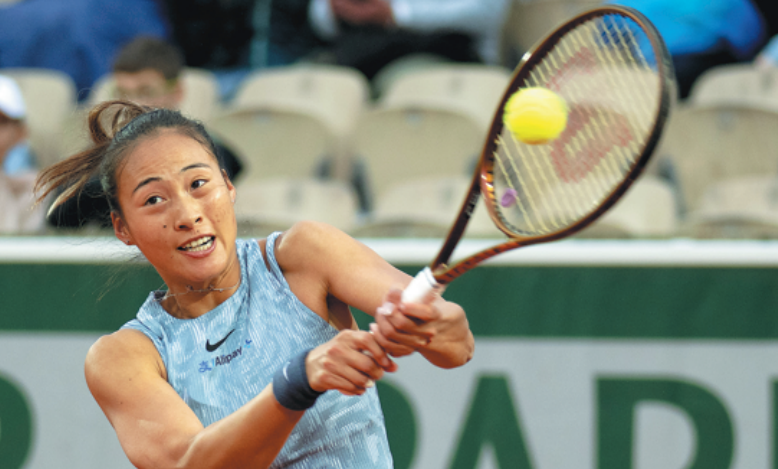
No Chinese tennis player has reached the Olympic podium for 16 years. However, this summer, the national team represents a significant force in Paris compared to previous Games.
The Chinese team, featuring one man, Zhang Zhizhen, and six women led by Zheng Qinwen, is now set to make a strong push for medals at Roland Garros, where the tennis events will be held from July 27 to Aug 4.
Team China unveiled its lineup for the women's singles events at the upcoming Olympics on June 28. The team will feature four players: Zheng, Yuan Yue, Wang Xinyu, and Wang Xiyu. The appearance of Zheng, currently ranked seventh in the world, is particularly anticipated, given her strong performances on clay.
After an early exit at Wimbledon, the Chinese ace made a timely comeback at the WTA 250 Palermo Open, which wrapped up last Sunday. Displaying her resilience and skill, she navigated through the competition and successfully defended her title, extending her personal winning streak in Palermo to an impressive 10 matches.
Zheng's mastery over the clay courts of Sicily was undoubtedly a strong shot in the arm for her Olympic medal pursuit, setting the stage for a promising performance on the red dirt of Paris.
Zheng, seeded sixth for the Olympic tournament, is ready to tackle the challenge head-on.
"I always love the pressure that only tennis can give me," said Zheng when asked about the feeling of representing China at the Paris Games. "You play under pressure, and, when you achieve victory, the happiness is even greater, because becoming a champion is so difficult. That's why everyone wants it, everyone is fighting for it.
"I think I would fight until I die. If it means breaking my body, I will do it, because the Olympic Games only come once every four years. I will give everything for them."
Despite the absence of top-ranked players like Aryna Sabalenka and Ons Jabeur, who have withdrawn from the Olympics, the women's singles competition remains highly competitive. Notable contenders include Poland's Iga Swiatek, the 2024 French Open champion, and Wimbledon champion Barbora Krejcikova.
China's best result in women's singles at the Olympics remains Li Na's fourth-place finish in 2008.
Debutant Zhang to shine
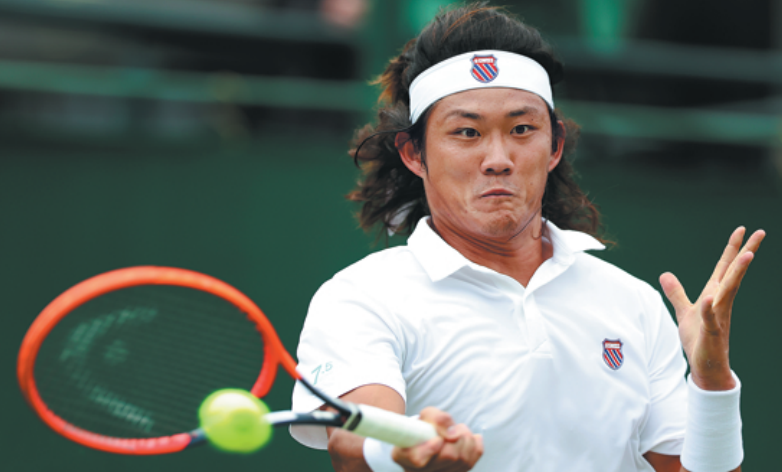
The men's singles draw for the Paris Olympics features a who's who of tennis superstars.
Leading the field are the newly crowned world No 1, Italian sensation Jannik Sinner and Spanish prodigy Carlos Alcaraz, who has won both the French Open and Wimbledon titles in the last two months. The tournament will also be the Olympic swan song of tennis greats Rafael Nadal and Novak Djokovic, who are more than likely making their final Games appearances, adding significant interest to this year's tournament.
Representing China in this elite field is Zhang, the sole male player on the Chinese Olympic tennis team. Zhang, a Shanghai native, achieved the milestone of winning a match at all four Grand Slam tournaments with his first-round victory at Wimbledon earlier this month, and is hoping to make a significant impact on the Olympic stage.
Zhang earned his Olympic spot by winning the gold medal at the Hangzhou Asian Games last year. On Monday, he reached a new career-high ATP ranking of 31st, setting a record for the highest world ranking ever achieved by a male player from the Chinese mainland.
As China's top male player, Zhang has reached the third round at the past two French Opens. Known for his strength on clay courts, there is a lot of expectation on him to boost China's Olympic tennis performance.
Zhang has stated that, as this will be his first — and possibly only — Olympic experience, he is committed to delivering his best.
The Chinese Olympic tennis contingent also features the powerful women's doubles partnerships of Yuan Yue and Zhang Shuai, as well as Wang Xinyu and Zheng Saisai.
At June's WTA500 Berlin Open, Wang Xinyu and Zheng Saisai stormed through the competition, clinching the championship with a two-set victory in the final.
This marks their second title together, following their triumph at the 2021 WTA250 Courmayeur Open in Italy, solidifying their partnership for the Olympic journey.
Mao Yixun contributed to the story.

PARIS - The draw for the Paris Olympic Games table tennis competition was made here on Wednesday.
World No 1 mixed doubles pair Wang Chuqin and Sun Yingsha of China, No 3 Lim Jong-hoon and Shin Yu-bin of South Korea, Chinese Taipei's Lin Yun-ju and Chen Szu-yu and host nation France's Alexis Lebrun and Yuan Jia Nan are in the first half.
No 2 seeds Tomokazu Harimoto and Hina Hayata of Japan and Doo Hoi Kem and Wong Chun Ting of Hong Kong, China are leading field in the second half.
In the women's singles event, top-seeded Sun Yingsha could possibly face Hina Hayata of Japan and Adriana Diaz of Puerto Rico en route to the final, while Chen Meng is in the second half with Shin Yu-bin, Bernadette Szocs of Romania, and Prithika Pavade of France.
On men's side, world No 1 Wang Chuqin will confront challenges from Hugo Calderano of Brazil and Qiu Dang of Germany in the first half, while his compatriot Fan Zhendong is in the second half alongside Lin Yun-ju, Dimitrij Ovcharov of Germany, Tomokazu Harimoto, and French rising star Felix Lebrun.
In the men's team event, China and the host nation France are in the first half, while Germany, Japan and Chinese Taipei are in the second half area.
In the women's team event, China and South Korea are in the first half, while Japan, Germany and India are in the second half area.
The table tennis competition runs from July 27 to August 10 at South Paris Arena 4 in Paris.
The 2024 Olympics in Paris will mark the debut of a new sport, breaking. The breaking competition is comprised of two events, one for men and one for women, where 16 B-Boys and 16 B-Girls will face off in spectacular solo battles.
China's B-girl Liu Qingyi has qualified for the Paris Olympics breaking competition, thanks to her gold medal at the Hangzhou Asiad last year. China's Qi Xiangyu and Zeng Yingying also obtained spots in the men's and women's events, respectively.
Paris Olympic organizers have scheduled the competitions on Aug 9 and 10, the last two days before the Paris 2024 closing ceremony, as a closing program of a series of urban sports.
Click the video to learn more about this new Olympic program.
Editor's note: With the Olympic stage set, and golden glory beckoning, Chinese athletes have been going all-out to ensure it will be a medal-laden campaign at Paris 2024.

As the Paris Olympics approach, unlike many teams striving for personal bests or podium finishes, the Chinese national table tennis team has a single, straightforward objective: to sweep all five gold medals.
That mission starts on July 27 at South Paris Arena and ends, hopefully accomplished, on Aug 10.
The Chinese team, a balanced mix of seasoned veterans and promising newcomers, arrived in Paris on July 15, focused on ensuring it is.
"Our goal has always been to win all the gold medals," declared Liu Guoliang, president of the Chinese Table Tennis Association and a former world and Olympic champion. Upon its arrival, the team spent the first week adjusting to the time difference and soaking up the Olympic atmosphere.
"It's crucial for the athletes to acclimate to the time zone and environment, and manage their emotions and mindset. They will feel a surge of excitement and gradually get into competition mode," Liu explained.
"The plan includes a training camp, settling into the Olympic Village, and warm-up games leading up to the tournament," he said.
In the women's singles at the Paris Olympics, Sun Yingsha and Chen Meng are the favorites for gold. At 23, Sun is known for her versatility and consistency, achieving remarkable results in the current Olympics cycle. Competing in singles, team and mixed doubles, Sun is the top seed in all three events, and is determined to grab all three golds.
Sun is intensely focused on her preparation. "Once I enter the Olympic Village, my mind is solely on table tennis. From stepping into the competition venue, I start adjusting my mindset. During the matches, I will give my all," she said.
In March, the International Olympic Committee named Sun as one of the five female athletes to watch at the 2024 Paris Olympics. Despite her young age, Sun has topped the ITTF women's singles rankings since July 2022. A seven-time world champion, she would make history in Paris by winning all three golds, the IOC stated.

Tokyo Olympics women's singles champion Chen, now 30, brings extensive experience to the squad, and aims to defend her title. If Chen and Sun face off in the final, it promises to be a thrilling showdown.
In men's singles, Wang Chuqin and Fan Zhendong are the top contenders. At 24, Wang is making his Olympic debut, but his rapid progress during the Paris Olympic cycle has been remarkable.
Wang's breakthrough came at last year's Hangzhou Asian Games, where he won four gold medals, becoming the first male player in Asian Games table tennis history to do so. This year, he continued his winning streak, claiming titles at the World Team Table Tennis Championships in Busan, South Korea, the World Table Tennis (WTT) Singapore Smash, the WTT Star Contender meet in Doha, Qatar, and the WTT Saudi Smash. His excellent form will enable him to mount a challenge for a first Olympics singles title in Paris.
Fan, with his solid technique and extensive experience, is showing signs of a resurgence. In a field dominated by Chinese players, he won the 2023 men's singles title at the World Table Tennis Championships in Durban. With only an Olympics men's singles title missing from his collection, he is determined to complete the "grand slam" and achieve his dream in Paris.
In the women's team event, Wang Manyu has grown more mature and composed during this Olympic cycle. With her on the squad, alongside Sun and Chen, the Chinese women's team aims to extend its streak to six consecutive Olympic golds.
Japan remains China's fiercest rival. At the 2024 Busan World Team Table Tennis Championships, Japan pushed China all the way, setting the stage for a likely showdown in the Olympic final.
In the men's team event, Ma Long stands as the team's cornerstone. With a men's team gold from London 2012, and both the singles and team golds from Rio 2016 and Tokyo 2020, Ma will compete in his fourth Olympics, aiming to claim his sixth gold medal. If the men's team wins, Ma will become the most decorated athlete in Chinese Olympic history.
A recent surge of global talent means that China's men must prepare for strong performances from European players on their home soil. The French brothers, Alexis and Felix Lebrun, are particularly notable for their versatile serves and aggressive play, excelling in the first three strokes.
Liu has indicated that European players may exceed expectations at the Paris Olympics due to their home advantage.
The biggest hurdle to China's goal of sweeping all of the table tennis golds in Paris is mixed doubles. At the Tokyo Games, China won both singles and both team golds, but missed out as Japan's Jun Mizutani and Mima Ito secured their country's first Olympic gold in mixed doubles, preventing China from achieving a clean sweep.
For Paris, China has focused on the mixed doubles pair of Wang Chuqin and Sun. Wang Chuqin's quick, aggressive play complements Sun's precise, agile style. Under coach Xiao Zhan, they have shown strong form, winning titles at major events including the World Championships and the Asian Games, and consistently topping the world rankings.
Their main competitors are Japan's Hina Hayata and Tomokazu Harimoto, who recently won the mixed doubles title at the WTT Star Contender Bangkok 2024.
With only one mixed doubles spot per team at the Olympics, this event is crucial. Wang Chuqin and Sun will need to stay highly focused to help China achieve a sweep of all five events.

With the curtain yet to be raised on the Paris 2024 Olympic Games, Chinese culture has captivated Paris with the launch of the China House, which highlights for the world the country's rich history and modern achievements.
Visitors to the China House can try some of the Olympic sports' earliest forms, such as pitch-pot, which tests participants' accuracy as much as modern archery by requiring them to throw arrows into a distant pot, and cuju, the ancient ball-kicking game that some consider to be a prototype of soccer.
The China House, a pavilion set up at the Hotel Salomon de Rothschild in Paris, opened to visitors on Wednesday and has captured the attention of Parisians and others with plenty of galleries, exhibits, demonstration events and social-networking activities on the sidelines of the Summer Games.
China's profound history, tradition and culture in sports participation, dating back thousands of years, as well as sports exchanges between China and the Games' host, France, are among highlights of this year's pavilion.

The launch of the house, a routine effort by the Chinese Olympic Committee since the first "China hut" was set up during the 2004 Athens Olympics, will take advantage of Olympics exposure to promote Chinese culture and friendship with the rest of the world, according to the COC.
"The China House has opened a window to our country's rich history, traditional sports culture, modern achievements and friendly exchanges with the whole world over the past 20 years," Yu Jianyong, a deputy secretary-general of the COC, said on Wednesday.
"This year in particular, we put a series of recent exchanges between China and France in the areas of sports and cultural development on display at the facility, to celebrate the 60th anniversary of the establishment of diplomatic relations between our two countries and to hail the joint efforts between China and France to promote the Olympic Movement," said Yu.
Visitors to the China House can watch a giant background screen featuring animated films that vividly depict activities by ancient Chinese such as boat diving, archery and wrestling.
Exhibitions featuring artifacts, scroll painting and sculptures document the Chinese people's sports participation through the dynasties, while the country's prowess at modern Olympic Games is demonstrated with medals, trophies and commemorative pins.

Some China House visitors who are featured in the exhibits couldn't hold back their emotions after reviewing and reliving their history-making moments.
"I've seen a lot of Chinese elements since arriving in Paris, and the sports and culture demonstration at the China House today took my breath away again," said Hui Ruoqi, a retired volleyball star who was a member of China's gold-medal women's team at 2016 Rio Olympics.
"I've met a lot of foreign visitors today asking me more of the stories behind the pictures on display. This has clearly shown an increasing interest around the world in the development of Chinese sports.
"Hopefully, the seeds of interest planted here will bring more foreigners to visit China and help them get to know China better," she said.
Contact the writers at [email protected]
PARIS - China's legendary table tennis player Ma Long and artistic swimmer Feng Yu will carry China's flag at the 2024 Paris Olympic Games opening ceremony on Friday evening.
Ma, who has claimed three team golds and two singles titles in previous Olympic Games, will be making his fourth Olympic appearance in Paris.
Having led China's artistic swimming team to a silver medal at Tokyo 2020, the 24-year-old Feng looks to dream bigger in Paris. China has made steady progress in artistic swimming in recent years, sealing golds in all five Olympic routines at the World Championships in Doha.
"The two candidates reflect our recognition of veteran athletes who persist in their careers, as well as the encouragement to the rising events and youngsters," said Zhang Xin, the secretary-general of the Chinese Olympic delegation.
Earlier, China has announced a delegation of 716 members, including 405 athletes, for the Paris Olympic Games. 136 male and 269 female athletes will compete in 236 events across 30 sports at the July 26-August 11 Games.

An ancient bronze mirror from the Song Dynasty (960-1279) not only reflects your image but also captures a lively game of cuju.
The reverse of the mirror depicts a young woman with a high bun kicking the ball with all her might to a man wearing traditional headgear. A referee watches intently for any infringements, while the lady's maid stands behind her, observing the game.
Cuju, a popular sport in the Song Dynasty, is the ancestor of modern football. The thrill of an exquisite pass or a powerful shot on goal is a timeless joy shared across generations.
With just two days to go until the opening of the Paris Olympics and the entry of so many talented athletes onto the world's stage, let's share our excitement.

A show mixing sportswear fashion with local traditional tangible cultural heritage performance was staged to welcome the upcoming Paris Olympics and the third anniversary of the introduction of "Quanzhou: Emporium of the World in Song-Yuan China" to the World Heritage List in Beijing on Tuesday.
Models dressed in sport brands made in Quanzhou featuring traditional culture designs like Quanzhou marionette (Quanzhou-style string puppet) rubbed shoulders with traditional culture performers on the catwalk. Spectators also experienced the local tea culture and Shaolin martial arts culture.
Quanzhou, well-known as city of manufacturing, is home to industrial clusters including textile clothing, shoes, food and furniture building materials. Sports brands including Anta and Peak are official sponsors to the Chinese delegation, some other sport delegations and International Olympic Committee working staff.
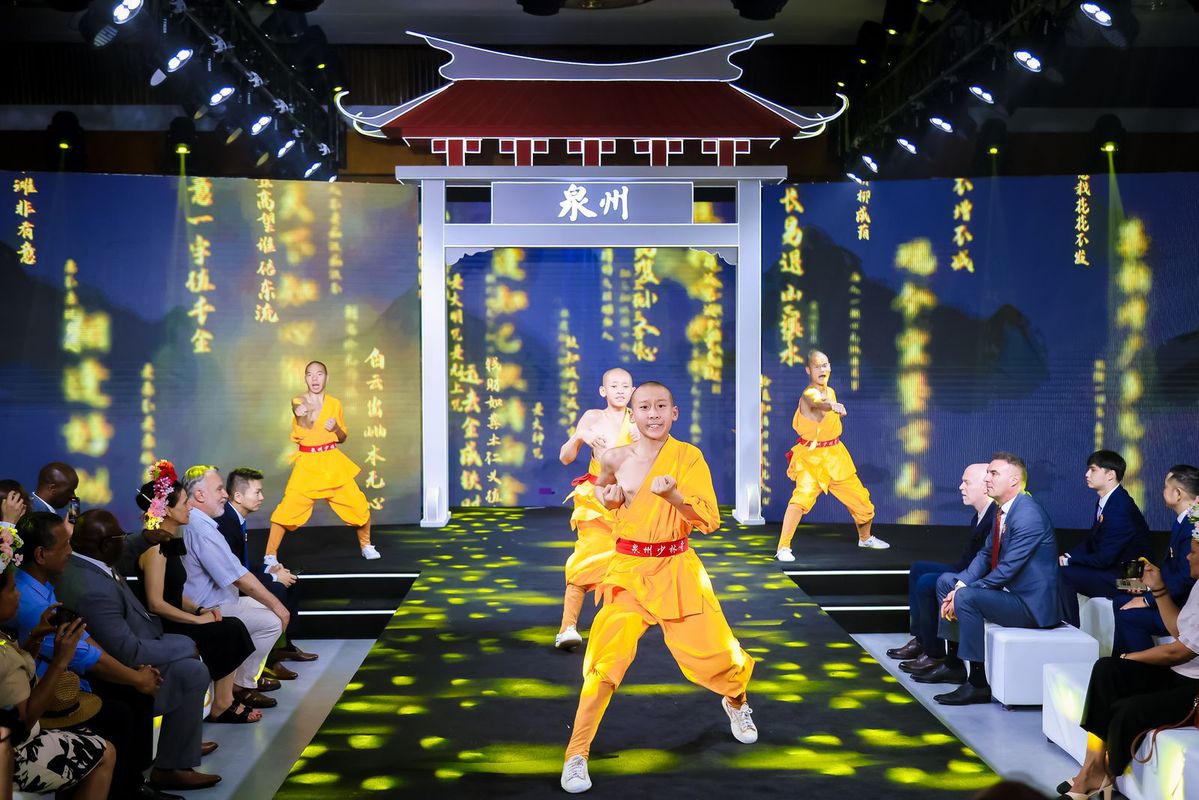
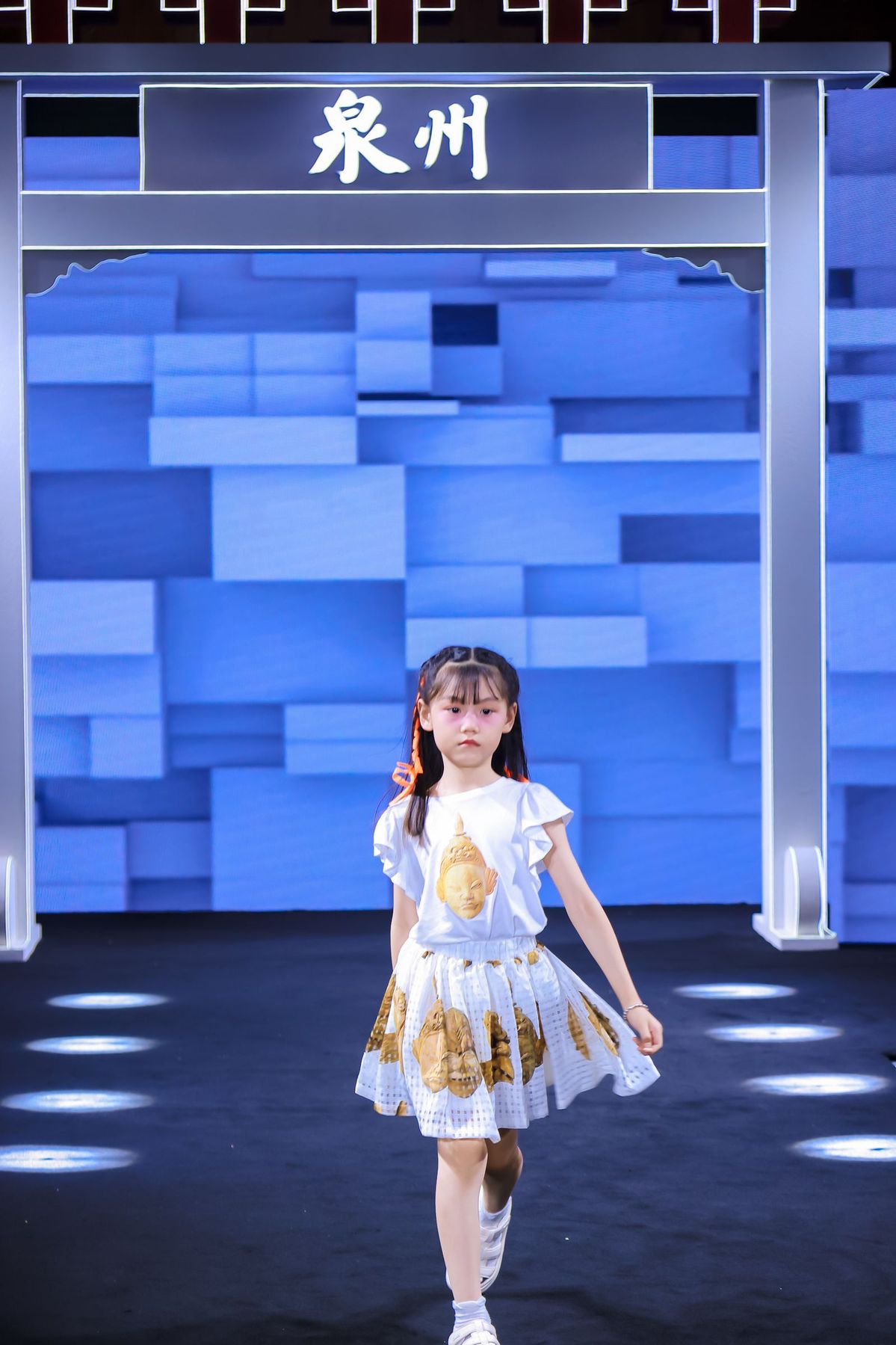
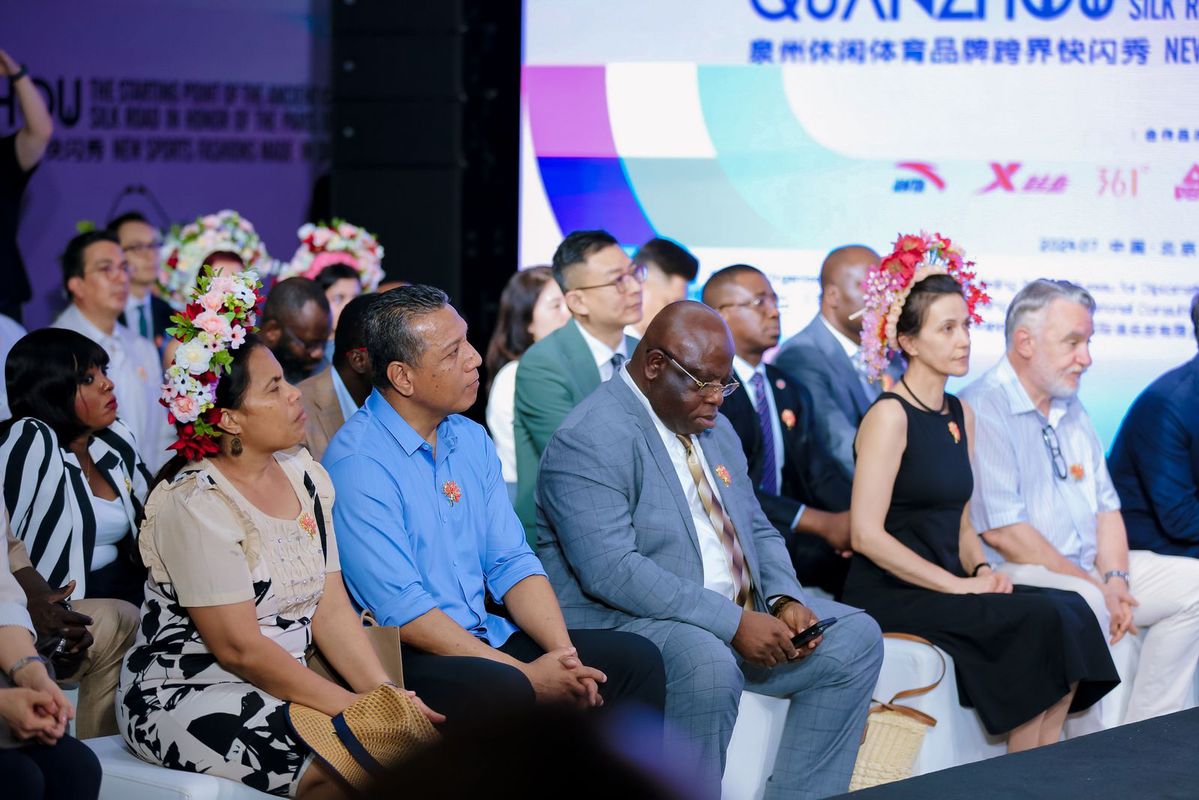
PARIS - The creation of the Olympic Esports Games has been confirmed during the ongoing 142nd Session of the International Olympic Committee (IOC) on Tuesday, scheduled for 2025 in Saudi Arabia.
"This is truly a new era for the IOC," said IOC president Thomas Bach. "With the confirmation by the IOC Session of the creation of the Olympic Esports Games, we are keeping up with the pace of the digital revolution."
The IOC announced on July 12 that it has partnered with the National Olympic Committee (NOC) of Saudi Arabia to host the inaugural Olympic Esports Games in the country in 2025, which has been endorsed by the IOC executive board unanimously.
"The esports community, represented in our Esports Commission, has enthusiastically engaged with this initiative. This is further proof of the attractivity of the Olympic brand and the values it stands for among young people," said Bach.
"The NOC of Saudi Arabia will bring great - if not unique - experience in the field of esports to this project. This partnership is based on the Olympic Charter and the Olympic values," he added.
HRH Prince Abdulaziz bin Turki Al Faisal, Minister of Sport and President of the Saudi Arabian Olympic and Paralympic Committee, emphasized the significance of the initiative.
"Our commitment to esports is simply a reflection of the world our young people live in. We now all have the chance to write new Olympic history together," he said.
"The story of sport in Saudi Arabia is a story of transformation," added IOC member HRH Princess Reema Bandar Al-Saud, who is also a board member of the Saudi Arabian Olympic and Paralympic Committee.
"With over 23.5 million gamers, many of whom are women, hosting the Olympic Esports Games in 2025 is a natural progression in our journey to open up Saudi Arabia to the world and the world to Saudi Arabia," she said.
Saudi Arabia has quickly become a hub for esports, hosting numerous international tournaments with significant participation and global viewership in the last two years.
According to the IOC, the planning for the Olympic Esports Games will commence immediately, focusing on the selection of a city and venue, game titles, and the qualification process for participants.
Additionally, the IOC will establish a dedicated structure for the Games, distinct from the traditional Olympic model, to better address the unique nature of esports.
Bach again addressed the Olympic Esports Games at a press conference later on Tuesday, saying that "It is clearly a milestone because we are entering a new ground, but we are entering this new ground on a very firm base."
The IOC held the Esports Forum in July 2018 following the sixth Olympic Summit in Lausanne the previous year, during which the development of Esports was brought up as a main topic.
In 2023, the Olympic Esports Week was held in Singapore, after which Bach asked the IOC Esports Commission at the 141st IOC Session in Mumbai, India to study the creation of the Olympic Esports Games.

From the moment she qualified for her first Olympic Games as a 16-year-old high school student, Sydney McLaughlin-Levrone has never paid much attention to conventional wisdom.
For more than three decades, since Soviet hurdler Marina Stepanova became the first woman to run the 400m hurdles in under 53 seconds in 1986, the athletics world had wondered when, or if, the 52-second barrier would be broken.
Yet in the space of a few seasons, McLaughlin-Levrone has obliterated that long-standing benchmark, redefining notions of what was possible in her event.
In 2021 she clocked a world record 51.90 sec at the US Olympic trials in Eugene, Oregon, to become the first woman to break the 52-second mark.
She followed that up by shaving a massive 0.44 sec off her own record when she stormed to victory at the Tokyo Olympics in 51.46 sec.
In 2022, she bettered that again at the US trials in Eugene, with a time of 51.41 sec, before clocking a jaw-dropping time of 50.68 sec on her way to victory at the World Athletics Championships a month later.
After dabbling with the flat 400m in 2023, McLaughlin-Levrone returned to her specialist event this season, and has once again returned to her record-breaking ways.
She booked her place in Paris with another world record at the US Olympic trials last month, storming home in 50.65 sec, with a performance in which she appeared to take even herself by surprise.
"I was not expecting that," McLaughlin-Levrone said after her victory in Eugene. "I'm just amazed, baffled and shocked."
It was the sort of performance that suggests McLaughlin-Levrone is ready to make more history in Paris, where she could become the first woman ever to successfully defend the 400m hurdles title.
She is likely to face a stiff challenge in the form of Femke Bol of the Netherlands, who won gold at last year's world championships in Budapest in the absence of the injured American, and has just become only the second woman to break the 51-second barrier for the event.
But McLaughlin-Levrone has demonstrated she's never more dangerous than when pushed by a competitor, citing her early career rivalry with 2016 Olympic champion Dalilah Muhammad as helping to push her to new heights — a case of "iron sharpening iron" as she describes it.
Few would bet against McLaughlin-Levrone retaining her Olympic crown at the Stade de France on Aug 8, a day after she turns 25.
As well as her Olympic title, McLaughlin-Levrone will also be defending a five-year unbeaten streak in her event. Her last defeat over the 400m hurdles came in the final of the 2019 World Championships in Doha, where she was pipped for victory by her compatriot Muhammad.
Born in New Jersey in 1999, track and field was embedded in McLaughlin-Levrone's DNA.
Her father, Willie McLaughlin, reached the semifinals of the 400m at the US trials for the 1984 Olympics, while her mother Mary was a respectable middle-distance runner.
As a young girl, McLaughlin-Levrone watched the 2008 Beijing Olympics, and her idol Allyson Felix, and was determined that she would, one day, perform on the same stage.
After qualifying for her first Olympics as a teenager in 2016, McLaughlin-Levrone's progression continued steadily before her breakthrough Olympic crown in 2021, her improvements coming rapidly after linking up with new coach Bobby Kersee in 2020.
In Tokyo, she added another gold medal after forming part of the 4x400m relay squad, where she raced in a quartet alongside Felix.
"Since I was eight years old, that's something I had aspired to do, and for it to finally come to fruition felt like a weight off my shoulders," McLaughlin-Levrone said of her Tokyo gold.
Victory in Paris would raise the prospect of McLaughlin-Levrone targeting a third straight Olympic gold at the 2028 Los Angeles Games.
While Los Angeles remains a long way away, McLaughlin-Levrone says she sees herself running well beyond this summer's Olympics.
"It does get harder as the years go by," she said in an interview with Women's Health magazine.
"You're pushing your body to its limits. It's a part of sports that can be physically draining, mentally draining, and that's why taking breaks and remembering why you love it is so important.
"Track is not going to last forever, so I'm trying to continue to enjoy it. I don't want to take anything for granted."
AFP

PARIS - Statistics has shown that swimmers from China were the most tested athletes ahead of the Paris Olympic Games, as World Aquatics revealed on Tuesday.
"The testing program, designed and implemented by the International Testing Agency (ITA), encompasses a wide range of tests conducted both in and out-of-competition," read a press release by the world governing body of six aquatic sports.
"In total, 2,145 anti-doping tests have been conducted by World Aquatics on athletes participating in the Olympic Games in Paris since 1 January 2024.
"Including tests conducted by other anti-doping organizations, aquatics athletes competing in Paris have been tested an average of 3.4 times, with 4,774 taken in total. This is the most tests ever conducted by World Aquatics before an Olympic Games."
World Aquatics emphasized that Chinese swimmers were the most tested during this period as "the 31 swimmers from China competing in Paris have each been tested at least 10 times by World Aquatics, with an average of 13 tests per swimmer".
"World Aquatics conducted a total of 418 tests through this program. All Chinese swimmers have been tested out-of-competition at least eight times by World Aquatics, independently of any other anti-doping organization and using a WADA-accredited laboratory based in Europe," it said.
"Including tests conducted by other anti-doping organizations, Chinese swimmers have been tested on average 21 times since January 1, 2024.
"Australian swimmers have been tested an average of four times in the same period, and USA swimmers an average of six times," it added.
